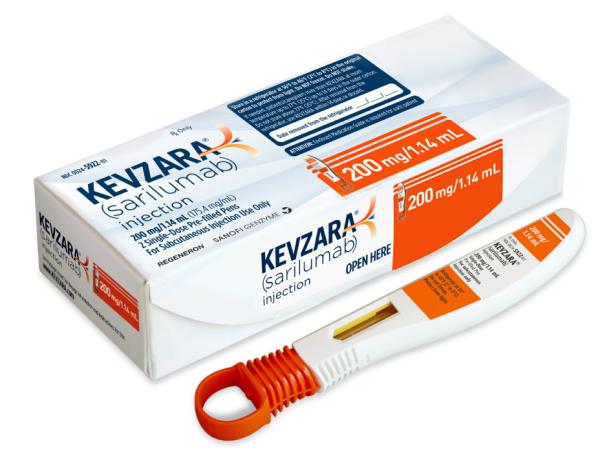Kevzara Interactions
There are 345 drugs known to interact with Kevzara (sarilumab), along with 7 disease interactions, and 1 alcohol/food interaction. Of the total drug interactions, 59 are major, 277 are moderate, and 9 are minor.
- View all 345 medications that may interact with Kevzara
- View Kevzara alcohol/food interactions (1)
- View Kevzara disease interactions (7)
Most frequently checked interactions
View interaction reports for Kevzara (sarilumab) and the medicines listed below.
- Actemra (tocilizumab)
- amlodipine
- atorvastatin
- baclofen
- cyclobenzaprine
- Cymbalta (duloxetine)
- Enbrel (etanercept)
- folic acid
- gabapentin
- hydroxychloroquine
- ibuprofen
- levothyroxine
- lisinopril
- losartan
- Lyrica (pregabalin)
- meloxicam
- metformin
- methotrexate
- omeprazole
- ondansetron
- pantoprazole
- Plaquenil (hydroxychloroquine)
- prednisone
- Rinvoq (upadacitinib)
- tizanidine
- tramadol
- trazodone
- Vitamin B12 (cyanocobalamin)
- Vitamin D3 (cholecalciferol)
- Zyrtec (cetirizine)
Kevzara alcohol/food interactions
There is 1 alcohol/food interaction with Kevzara (sarilumab).
Kevzara disease interactions
There are 7 disease interactions with Kevzara (sarilumab) which include:
- infections
- tuberculosis
- blood disorders
- diverticulitis
- hepatic impairment
- hyperlipidemia
- renal dysfunction
More about Kevzara (sarilumab)
- Kevzara consumer information
- Compare alternatives
- Pricing & coupons
- Reviews (30)
- Drug images
- Side effects
- Dosage information
- Patient tips
- During pregnancy
- FDA approval history
- Drug class: antirheumatics
- Breastfeeding
- En español
Related treatment guides
Drug Interaction Classification
| Highly clinically significant. Avoid combinations; the risk of the interaction outweighs the benefit. | |
| Moderately clinically significant. Usually avoid combinations; use it only under special circumstances. | |
| Minimally clinically significant. Minimize risk; assess risk and consider an alternative drug, take steps to circumvent the interaction risk and/or institute a monitoring plan. | |
| No interaction information available. |
Further information
Always consult your healthcare provider to ensure the information displayed on this page applies to your personal circumstances.


